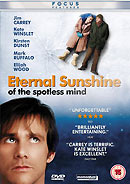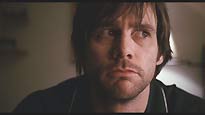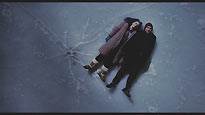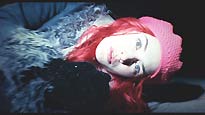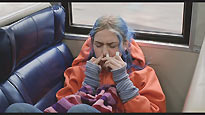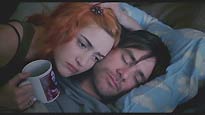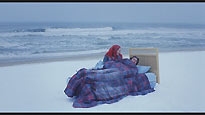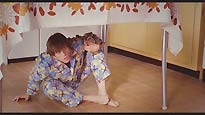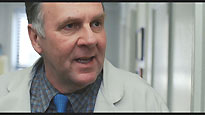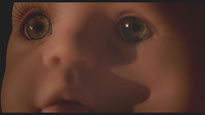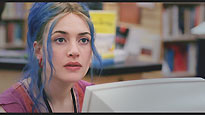|
ETERNAL SUNSHINE OF THE SPOTLESS MIND Region 2 Edition Director: Michel GondryFeaturing: Jim Carrey, Kate Winslet, Tom Wilkinson, Kirsten Dunst
THE FILM Boy meets girl. They fall in love. There's an acrimonious parting. Girl has boy wiped from her memory using a revolutionary mind-erasing technique. It's a story as old as the movies themselves! Part exquisite romance, as heartbreaking as anything committed to celluloid, and part Philip K. Dick-style science fiction drama, Eternal Sunshine of the Spotless Mind is a quixotic, delightful film. The film hooks the viewer immediately with a charming blossoming romance between the two leads (Carrey, remarkably - but not totally - restrained, and Winslet, compelling). Then it puts the characters the audience has come to love through hell. It's a film about love triumphing through adversity, but there are no easy solutions: Joel and Clementine's relationship seems as fragile at the end of the film as it was tentative at the beginning.
THE DVD Focus Features' presentation of Eternal Sunshine of the Spotless Mind reflects the film's modest budget (estimated to be about $20m). The film's cinematography (by Ellen Kuras) relies a great deal on hand-held camera work, and often uses a single light source for effect (notably in the scenes where Joel and Clementine are being chased by the searing spotlight of Doctor Mierzewiak's mind-erasing technique). The film stock struggles with the low-level lighting conditions, often becoming quite grainy. In some shots areas that should be black are contaminated with blue (a photochemical developing fault). The frequently results in an image that's coarse-looking. If this isn't a deliberate choice on the part of the filmmakers, it was probably considered a tolerable by-product of being able to work with naturalistic lighting. The film's transfer to disc is unremarkable. It often looks very nice indeed, but there are patches where it looks rather dull and lifeless. There are no distracting coding artefacts (except one very disruptive glitch at 37'08", which has apparently been fixed for the final pressing). The transfer copes well with a wide variety of moods and tones. The film is presented in its original 1.85:1 theatrical ratio, with anamorphic enhancement. The film's audio mix is sublime. The sound is often used to help the viewer orientate between what's real, and what's taking place in Joel's head, using subtle and sometimes not-so subtle sound manipulation. Jon Brion's quirky score is the perfect accompaniment to the film, often acting as a vivid counterpoint to what's going on on-screen. The disc offers a choice of DTS (754kbps) and Dolby Digital 5.1 (448kbps) audio tracks. Both are fine, although the DTS track undoubtedly has the edge for scenes with a delicate ambience, and has marginally better separation (the split between the centre speaker dialogue and Brion's score, from the side speakers, is often very demanding, and the DTS track is definitely preferable). Much of the film is weighted to the front speakers, but the mix comes alive for the scenes inside Joel's head, where there are plenty of embellishments that utilise the rear speakers. It's a very effective mix, that serves the film perfectly. Unfortunately the DTS track features two brief audio holes (at 32'11" and 85'12", on the "find" in "I'm gonna go find the bedroom"). Focus Features are apparently unwilling to fix these, claiming that the audio is "director approved". These audio dropouts aren't present on the Dolby Digital track, so they're obviously not intentional. Momentum would like to point out that they would have fixed these problems if they had been able to - the are simply distributing the disc on behalf of Focus Features. The film is supported by English subtitles (albeit American ones, with spellings like "favor" and "honors"), but there are no subtitles for the bonus features.
THE BONUS MATERIAL The disc features a good selection of bonus materials - certainly as much as you could reasonably ask for from a single-disc edition. Fans of the film will find the commentary track, with director Michel Gondry and writer Charlie Kaufman, fascinating. Gondry has a heavy French accent, so it's easy to differentiate between the two speakers. They freely acknowledge that the film is difficult to unravel the first time you see it, since there are so many small details that only really make sense once you know what's happening. It's likely that many people will want to watch the film more than once, and the filmmakers admit that this may have artificially inflated the film's box office takings (that is they were high, relative to the actual number of people who saw the film). The filmmakers explain about the clever idea that inspired the film (it began with the idea of receiving a courtesy card through the post that said that someone had erased you from their memory), and also reveal that many individual incidents in the film, particularly the relationship break-up scenes, were inspired by their own real life experiences. The film has many remarkable sequences (the one at Grand Central Station, for example, the location of the equally magical ballroom sequence in Terry Gilliam's The Fisher King), but there's often not enough time to explain how they were created. Later there are patches of silence, which is frustrating, because there are so many questions an enquiring mind would like answered. A Look Inside Eternal Sunshine of the Spotless Mind (11m) is a nicely-made promotional featurette ("In Theatres March 19"), featuring sound-bite interviews with the principal cast and crew members, and a fair bit of behind-the-scenes footage. Despite its brevity, there are some interesting moments. Kate Winslet makes an interesting point: that she's reversed roles with Carrey (Carrey usually plays larger-than-life, energetic, outgoing roles, and Winslet usually plays laced-up (period drama) parts). A Conversation with Jim Carrey and Director Michel Gondry (15m). The nondescript title doesn't do justice to what is a very nice featurette, which includes a frank and free-flowing chat between the film's director and its star, who clearly have a rapport. It's inter-cut with behind-the-scenes footage, including material shot on the kitchen set, which shows how forced perspective was used to create the illusion of a child-sized adult Joel. They chat, too, about the scene with the elephants, which was staged at the drop of the hat, when they discovered that the circus was being paraded through the streets near where they were shooting. There are some precious glimpses of Carrey and Winslet rehearsing: it would have been very nice to see more of that. There's a minor picture break-up fifty-seven seconds into this featurette, and a couple of other glitches in the source material, but they're fleeting, and not at all disruptive. Deleted Scenes (7m) No context is given for these scenes, not even a chapter list (they play back-to-back, even though each scene has its own chapter mark). The scenes are: Joel and Clementine sneaking into a theatre; Doctor Mierzwiak recording Joel's description of how he met Clementine; a sequence when Joel phones his ex, Naomi (Moonlight Mile's Ellen Pompeo); and a scene where Joel and Clementine are larking around on the bed (which features a nice in-camera "disappearing" trick). A couple of deleted scenes discussed in the commentary - love scenes between Joel and Clementine, and between Stan (Mark Ruffalo) and Mary (Kirsten Dunst) - aren't included, sadly. Picture quality is fine. The deleted scenes are presented in non-anamorphic letterbox format, with timecode. However, they're flagged on the disc as being anamorphic, which means if you play them back on equipment that switches automatically (a 16:9 TV set connected by scart cable, or a PC, for example), they'll appear horizontally-stretched. Focus Features, the disc's producers know there's a problem, but won't be fixing it: "Only the feature aspect ratio is displayed on the back. DVD Extras can come in any aspect ratio. Hopefully the viewer will either address the squashed picture by resizing their screen or as often or not...they won't even notice". Polyphonic Spree "Light and Day" Music Video (3m) - a bouncy music video which uses clips (and outtakes) from the film. The characters in the clips have singing mouths superimposed over their real mouths, similar to those creepy talking infant commercials. It's a nice addition to the disc, although the analogue tape dropout that's present is another sign that the disc's producers weren't entirely fastidious. Lacuna Commercial (1m) - this is the full version of the Lacuna advert, briefly seen in the film: "Remember, with Lacuna, you can forget!"
SUMMARY Eternal Sunshine of the Spotless Mind is a wonderful film that will undoubtedly strike a chord with anyone who's loved and lost. It's a film that demands to be watched more than once, if the viewer is to wring every nuance of detail from Kaufman's complex story and Gondry's quirky direction. The technical presentation of the disc is adequate, reflecting the film's low-budget origins, and the often-difficult filming conditions. The two DTS audio dropouts and the flagging problem on the Deleted Scenes are irksome, and may be enough to make some potential customers consider buying a version of the film from another territory (the UK disc is coded for Region 2 only). The US version is substantially similar (it features additional trailers for The Motorcycle Diaries and Vanity Fair), and doesn't have the same technical problems. |
|||||||||||||||||||


